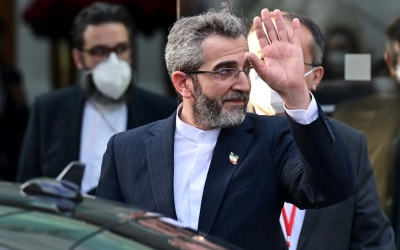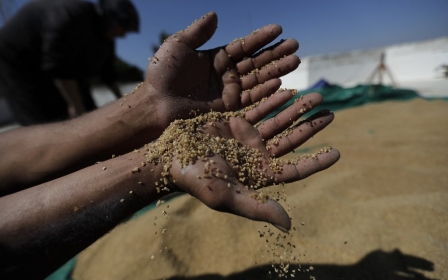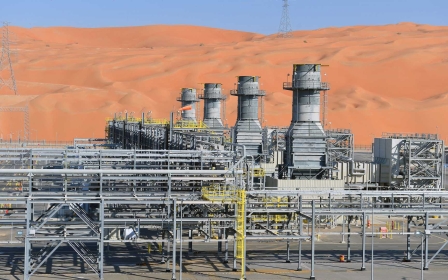Russia-Ukraine war: How soaring oil prices will be felt in the Middle East

Oil prices continued to skyrocket this week, reaching a 10-year high of $120 per barrel on Thursday, as the barrage of US and EU sanctions on Moscow hindered traders from importing Russian oil.
The price of Brent Crude rose to $119.84 a barrel, its highest level since May 2012, while West Texas Intermediate (WTI) prices touched $116.57, a price last recorded in 2008.
Russia's invasion of Ukraine last week has shaken up stock markets and energy sectors in the Middle East and North Africa.
For some countries, high oil prices are an opportunity. For others, it will likely mean higher prices for essential goods and severe inflation, a prospect some countries are not excited about, experts in oil and energy told Middle East Eye.
New MEE newsletter: Jerusalem Dispatch
Sign up to get the latest insights and analysis on Israel-Palestine, alongside Turkey Unpacked and other MEE newsletters
Social unrest
Countries that hold warmer ties with Russia, such as Iraq, Iran, Saudi Arabia and the United Arab Emirates (UAE), will be in the first camp. All of them are members of Opec+, an influential alliance of 23 oil producing nations.
Hashem Akel, a Jordanian expert in energy markets, told MEE that for the Opec+ countries, high oil prices would support more development projects and inject cash into the state coffers.
"The Gulf countries, along with Algeria, Libya and Sudan, will be able to profit from these prices amid the Russian-Ukrainian conflict. Moreover, the oil revenue will help some of them to continue their diversification of the economy to reach a level of less dependency on crude oil and support their citizens," Akel said.
However, countries such as Jordan, Tunisia and Lebanon will feel the pain of high oil prices in the form of increased cost of living and higher inflation rates.
"Lots of countries in the world are threatened with social unrest because of high oil prices," Amer Shobaki, a Jordanian energy expert, told MEE. "This will lead to the increase of prices of wheat and vegetable products."
Shobaki added that although Gulf countries will enjoy significant revenues from exporting oil in 2022, their citizens would still be affected by the high price of goods and petrol.
This week, the UAE, a major oil producer, increased petrol and diesel prices. In contrast, Jordan, a cash-strapped nation, had fixed prices from February until April in order to help ease the economic hardship on its citizens.
Akel added that fixing the price of petrol and diesel at a certain rate or decreasing taxes on these products could be a temporary solution for countries such as Jordan, Tunisia and Lebanon.
"Any increase in prices of bread and wheat, which many countries import from Russia and Ukraine, will also be more critical to ordinary people in the Arab world," Shobaki said. "The oil prices will affect bread prices as the transport cost of wheat will increase, which could lead to unrest," he added.
Tunisia increased the price of petrol this week, the second time in less than a month, and it is bracing for the worst. Almost half of Tunisia's grain imports come from Russia and Ukraine, and in 2019 nearly 750,000 Russian tourists had visited the country.
Nearly 80 percent of the wheat Israel and Egypt import comes from Russia and Ukraine. However, Jordan has stopped bringing in wheat, corn and barley from Russia due to increased fees in the past two years, relying mainly on Romania for its wheat imports.
"Each country has different circumstances in how to cope with high oil and wheat prices," Shobaki said.
Iran oil needed
High oil prices will also influence the political dynamics of the region, namely for Iraq, Iran, Saudi Arabia and the UAE.
The Organization of the Petroleum Exporting Countries (Opec) is made up of 13 oil producing states. In 2016, Opec's members were joined by 10 other major oil producing nations to form the loosely affiliated entity, Opec+.
The group's goal was to agree on an oil production quota for each country, in order to control prices. Opec+ commands over 50 percent of global oil supplies and about 90 percent of proven reserves.
On Wednesday, Opec+ decided to stick with its existing plan by producing only 400,000 barrels a day (BPD), overlooking calls from the US to pump more oil into the energy market to lower prices.
"There's an aversion towards the US in both Saudi Arabia and Iran, the two countries that have the capacity to produce more oil. Shale firms in the US are also not helping Biden's administration to produce more oil and bring the costs down," Akel said.
The US appears to have a few cards to play against Saudi Arabia and Iran, as traders fear that sanctions on Russian oil and gas companies, whose exports are a lifeline to Europe, will be coming soon.
'Mohammed bin Salman is expected to ignore US calls to boost oil production as long Biden keeps ignoring him'
- Hashem Akel
"This leaves the US with Iraq, which is a major oil producer and has the capacity to pump more oil," Akel said. However, the energy analyst does not think Baghdad will increase its oil supply without "approval from Tehran".
In January, Iran, which is currently under US sanctions and is engaged in talks in Vienna with world powers to revive the 2015 nuclear deal, announced that its oil exports had increased by 40 percent in 2021, producing almost 2.4m BPD.
However, if US sanctions were lifted, Iran could increase production to 3.8m BPD, oil minister Javad Owki said.
"I believe the US overlooked the leaking of Iranian oil. They were expecting the Russian-Ukrainian crisis, and they needed Tehran's oil to be in the market to keep prices low," Akel said.
Saudi and Emirati messages to US
Saudi Arabia is another oil giant, producing almost 10m BPD, which it could boost to 12m.
However, US President Joe Biden has given Saudi Crown Prince Mohammed bin Salman the cold shoulder ever since he was sworn into office, speaking with his father King Salman instead.
"It's no secret that Biden is not friendly to Mohammed bin Salman, as Donald Trump used to be," Akel said. "Mohammed bin Salman is the most powerful man in Saudi Arabia, the de facto leader and the future King. He is the one who will be making a decision, and he is expected to ignore US calls to boost oil production as long as Biden keeps ignoring him."
At first, Saudi Arabia, UAE, Iraq and Iran all refused to condemn Russia's invasion of Ukraine, which Moscow calls a "special military operation," with the UAE abstaining from voting in favour of a US-led resolution at the UN Security Council criticising Russia.
According to Axios, Abu Dhabi was sending a message to Washington by abstaining on Wednesday's vote, that it was disappointed by the American refusal to redesignate Yemen's Iranian-aligned Houthi rebel group as a terrorist organisation following its drone attacks on the UAE in January.
'The only solution to decrease the prices of oil, is actually to increase the prices of oil'
- Amr Shobaki energy expert
For now, oil prices are expected to keep rising as supply was already low due to a production decrease since March 2020 triggered by the Covid-19 pandemic, lockdowns and the reduction of international aviation.
Another issue is that some Opec+ countries appear on paper to be giant oil producers, but do not have the proper facilities to increase oil exports. Others cannot meet their quote for various different reasons.
Libya, for example, was a major oil producer, pumping out 1.65m BPD before the civil war in 2011. Since then, some of the country's energy facilities have been severely damaged and have fallen into the hands of different warring parties.
In 2020, Libya produced 360,000 BPD, and though it is en route to recovery, its oil production is shackled to political conditions and fluctuates each year.
"The only solution to decrease the prices of oil, is actually to increase the prices of oil," Shobaki said.
"This is what we learned from studying oil over the past century. High oil prices will lead to lower demand and abundance in supply and this will push the prices down again."
Middle East Eye delivers independent and unrivalled coverage and analysis of the Middle East, North Africa and beyond. To learn more about republishing this content and the associated fees, please fill out this form. More about MEE can be found here.





